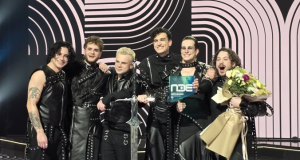Eurovision fans in Slovakia and beyond are once again disappointed. Although hopes for a return to the stage of the biggest music competition had flickered, the Slovak national broadcaster STVR has confirmed that Slovakia will not participate in Eurovision 2026. Still, the door for future participation remains open.
This news comes after earlier speculations that STVR was considering a return, but the obstacles were clearly greater than the desire. In an official statement, in response to an inquiry from an Israeli website, it was stated that „Slovak participation in Eurovision is considered annually.“ However, the key factors for withdrawal are the lack of stable management within STVR and the current financial situation of the Slovak public broadcaster. It was concluded that „participation is not feasible (under the present conditions).“
This decision isn’t surprising for those who follow Slovakia’s Eurovision journey. The country last appeared at Eurovision in 2012, when Max Jason Mai with the rock song „Don’t Close Your Eyes“ finished last in the semi-final. This wasn’t an isolated case – Slovakia faced qualification failures in previous appearances as well. Since then, financial problems, a small domestic audience, and a lack of past successes have been the reasons leading to its withdrawal in 2013 and continuous absence.
However, a glimmer of hope comes from STVR. Filip Púchovský, a spokesperson from STVR’s public relations and marketing department, reiterated an earlier statement, emphasizing:
„“With the establishment of a new and duly appointed STVR management, we plan to reassess Slovakia’s participation in international projects, including Eurovision. It is not impossible that, in the future—under favorable financial and content circumstances—we will seek to return to the Eurovision Song Contest.““
One of the main arguments against participation, shared by many smaller broadcasters across Europe, is the „disproportionately high costs of participation compared to overall income or public impact.“ For a small, underfunded broadcaster like STVR, which operates on a minimal budget and lacks strong governmental financial support, Eurovision represents a huge financial burden.
A brief look at Slovakia’s Eurovision history: From Czechoslovakia to today
Before Slovakia gained independence, Czechoslovak Television (ČST) broadcast numerous editions of the contest, and Karel Gott even represented Austria in 1968. The Prague Theatre of Illuminated Drawings was also an interval act at Eurovision in 1984.
After the dissolution of Czechoslovakia, Slovakia planned its debut in 1993 but didn’t pass the „Kvalifikacija za Millstreet“ qualifying round. They officially debuted in 1994 with the group Tublatanka and the song „Nekonečná pieseň“, but finished in 19th place. Their best result to date was in 1996, when Marcel Palonder with the song „Kým nás máš“ finished 18th. Due to poor results and financial issues, Slovakia withdrew after 1998, returning only in 2009.
The second period of participation (2009-2012) also didn’t bring the desired success. Despite the popularity of songs like Kristína’s „Horehronie“ in 2010, Slovakia never qualified for the final. Their last participation, as mentioned, was with Max Jason Mai in 2012, after which the final withdrawal followed.
However, despite a decade of absence, the fan community in Slovakia is growing, and public awareness of the contest is increasing. Countries like Malta, San Marino, and even Georgia have shown that persistence, originality, and the right—even commercial—support can lead to success. Experience shows that the right combination of focused investment, a unique cultural narrative, and support from the local community can change the picture.
It remains to be seen whether the new STVR management, combined with more favorable financial circumstances and potential commercial support, will manage to bring Slovakia back onto the Eurovision map. For now, Slovak fans will have to be patient and hope that the „doors“ that have been left open will indeed open in some future edition of Eurovision.
Slovakia’s representative at the Eurovision Song Contest 2010 in Oslo
 OGAE Serbia :: Vaš evrovizijski svet
OGAE Serbia :: Vaš evrovizijski svet



